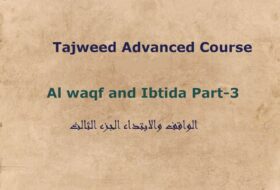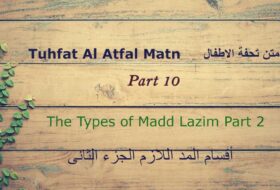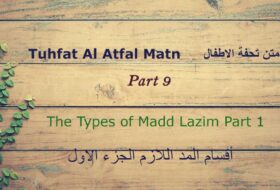Al waqf and Ibtida Part2 الوقف والأبتداء الجزء الثانى
Read: Part1 Part3 part4
3-The Good Waqf (stop ) الوقف الحسن
Its Definition: It is the stop on a Quranic word, complete in its meaning, but is attached to what follows it grammatically and in meaning.
It could be attached grammatically such as stopping on something that has a subsequent adjective, before the adjective. It could be stopping on a conjunctive sentence, without the conjunction and its following phrase.
Another possibility is stopping on an exceptional statement, without the exception.
The good stop can be found at the end of verses, or in the middle of verses, just as the other stops.
It is called “hasan” or good due to the fact that stopping on it leads to understanding of a meaning.
The rule for the good stop: it is allowed to stop on it, but not allowed to start on what follows it due to its attachment to what follows grammatically and in meaning, except on the end of an aayah. Stopping on the end of an aayah is Sunnah.
You can stop on the word اللَّـهِ as the meaning in itself is fully understood.
In the name of Allah بِسْمِ اللَّـهِ
Than start الرَّحْمَـٰنِ الرَّحِيمِ
But you can‟t start with what comes next due to its attachment to what follows grammatically and in meaning.
-It is allowed to stop on it إِن تَمْسَسْكُمْ حَسَنَةٌ تَسُؤْهُمْ
But it is better to continue reading وَإِن تُصِبْكُمْ سَيِّئَةٌ يَفْرَحُوا بِهَا
3-The Repulsive Waqf (stop ) الوقف القبيح
Its Definition: It is the stop on what does not give a correct meaning, and that is due to its strong attachment to what follows in grammar, and in meaning.
The rule for the repulsive stop:This stop not allowed intentionally. It is only allowed when compelled in such as a situation as unexpected shortness of breath, sneezing, or forgetting. After the state that compelled the stop has past, the reader then must repeat one, two, or more words, as necessary to convey the correct and sound meaning.


- Do not stop on a verb without its subject (the doer of the verb).
- Do not stop on a subject of a verb without the object of the verb.
- Do not stop on a preposition without the object of the preposition.
- Do not stop on a possessive noun ( possessed ) without the possession expression ( the possessor ) / two nouns the second is the possessive of the first noun (As in the “teacher’s book ” The word “teacher’s” is the possessor
and the book is the possessed). - Do not stop on the subject of the nominal sentence without the predicate – a nominal sentence in Arabic has no verb.
- Do not stop on a word with is characterized without that which characterizes it.
- Do not stop on a conjunction without its conjoined noun.
- Do not stop on a noun which is in a state ( or case) without the word which gives the state (accusative).
- So not stop on a number ( count) without that which is being counted.
- And don’t stop on an emphasized noun without the emphatic term.













